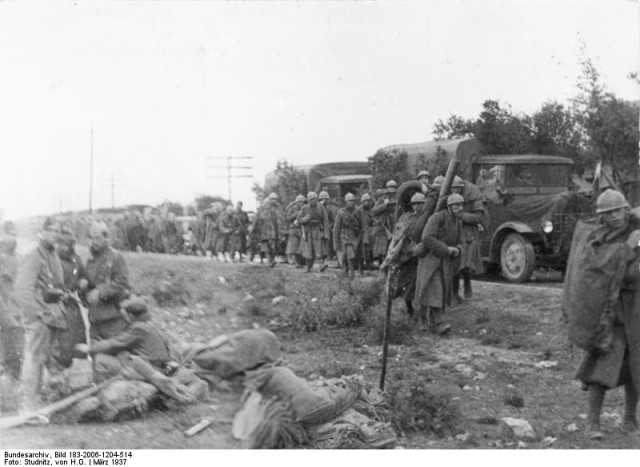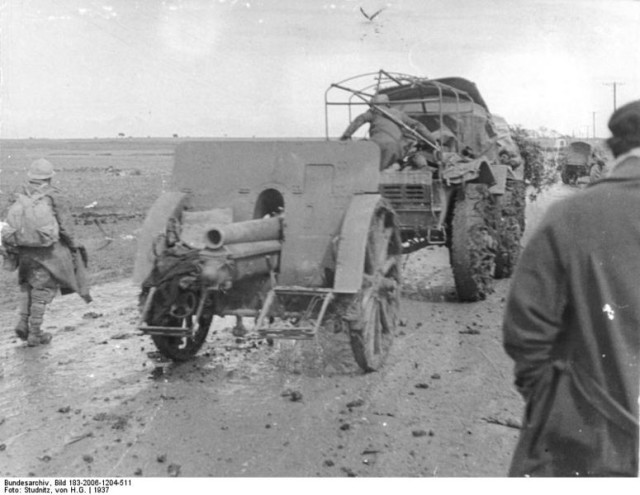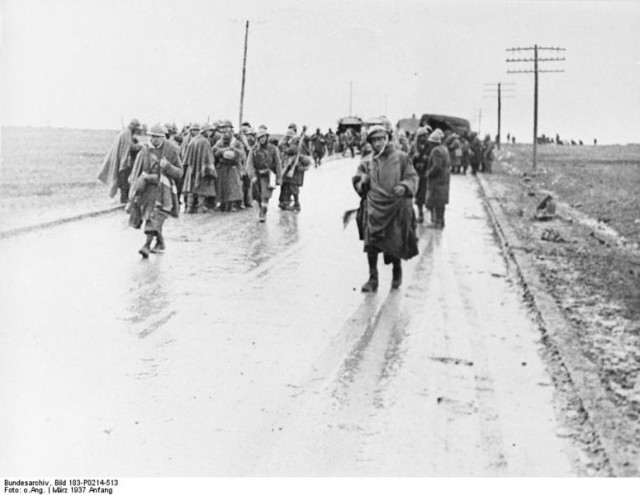Proxy wars have been an ugly feature of military history since ancient times, powerful nations turning others into battlegrounds without risking themselves in full-scale warfare. In the 1930s, the Spanish Civil War took on some of the features of such wars, as the far right regimes of Germany and Italy backed conservative dictator Franco against a left-wing government backed by European liberals and Soviet Russia.
This war was a proxy for the rising conflict between fascist nations and their liberal neighbours, a conflict that would eventually become the Second World War. It was also a proxy for the conflicts going on within individual nations, as politically motivated volunteers or government-sponsored soldiers went to fight for opposing sides.
And so it was that, at Guadalajara in 1937, Italians fought against Italians on Spanish soil, as they struggled for the fate not only of Spain but of their own homeland.
Franco and Mussolini
When the Spanish Civil War broke out, Mussolini leapt at the opportunity to become involved. None of the far right regimes that rose to power in Europe in the 1930s were identical in their agendas, but the right-wing Nationalists under General Franco were men Mussolini could work with. Franco, for his part, was glad of the offers of support. Though he had a lot of backing from the Spanish army, he was facing a fierce struggle.
The troops Mussolini sent were not what Franco had expected. Instead of volunteers to join his own regiments, he received an entire organised force of Italian army units, alongside divisions of the Blackshirts, Mussolini’s political troopers. The Italians were there to win a few spectacular victories, giving Mussolini a political boost at home, not to be part of Franco’s own plans.
As a result, relations between the Spanish Nationalists and their Italian allies were often bad, and the locals took pleasure in seeing their supposed friends in trouble.
General Roatta – No Scipio in Africa
At the Battle of Guadalajara in September 1937, the Italian forces were commanded by General Roatta. He 35,000 troops, some of them regulars and others blackshirts, as well as 200 guns and 80 tanks. This was backed by 60 aircraft, an area of combat in which the Nationalists and their allies often dominated.

The regular troops were not all hardened professionals. Many were conscripts, and others labourers who had been tricked into coming to Spain, having been told that they were going to Africa as extras for the film Scipio in Africa. They might have numbers and technology, but this was not a force eager to be in the field.
The Garibaldi Battalion
The opposite side at Guadalajara included the 12th International Brigade. The International Brigades were made up of volunteers from across Europe and beyond, people who had come to Spain to fight for their political ideals, as depicted in the film Land and Freedom. French, British, Russians, Americans and others, they were a disparate group, most not professional soldiers, but all determined to fight hard.
As chance had it, the spearhead of the 12th International Brigade at Guadalajara was the Garibaldi Battalion, a force of Italian volunteers named after the revolutionary who united their country. Like the other volunteers, they were not just fighting for the sake of Spain.
They hoped that a Republican victory would further the left-wing cause around the world, and so in their home country. This was particularly important for the Italians, who would be brutally suppressed if they expressed their political views at home. In Spain they could fight for the soul of their own country.
Hard Fighting and Soft Warfare

General Roatta’s soldiers had not expected to face their fellow Italians, and their responses varied. Some fought bitterly against the volunteers, turning the battlefield into an Italian civil war in miniature. Others surrendered on discovering who their opponents were.
The Garibaldi battalion played upon their enemies’ uncertainty, using loudspeakers and leaflet drops to expose them to propaganda. Any of Roatta’s troops who surrendered were promised safe-conduct, and even a reward for handing over guns to the Republicans.
Failing to Keep Spirits Up
The Italians had every reason to abandon their officers. Little thought had gone into logistics, leaving them without fuel or detailed local maps. Pouring rain and stinging winds made life miserable, as well as ruining their improvised runways, preventing them from using their aircraft.
Their 3-ton tanks faced vastly superior 20-ton tanks supplied by Soviet Russia. And so they found themselves bombarded by unstoppable enemy aircraft and mechanised forces.
Roatta insisted that the best way to avoid desertions was to constantly remind the troops of Mussolini and how he wanted them to win. But with so many of them resentful at even being in Spain, this did little to raise the state of excitement he hoped for.
A Taste of Failure to Come
The Italian offensive stalled, turned into a retreat and finally became a full-blown route. With the Republicans moving in to encircle them, men fled Guadalajara. 3,000 died, 800 were captured and 4,000 were wounded.
The failures of logistics, combined arms and morale that had broken them were a taste of what was to come for Italian forces in the Second World War.
Toasting a Defeat

It was a demoralising defeat for the Italians, though some took comfort in the fact that they had been beaten by their fellow countrymen – it gave them reason to continue believing in their national superiority. Back home, Mussolini was furious. He ordered that until they won a victory, no Italian soldier could return from Spain alive.
The Republicans celebrated a victory in the face of supposedly professional opponents.
And back in Franco’s headquarters, some of his staff reportedly drank a toast to the Republicans, who had proved that even Communist Spaniards fought better than Italians.
